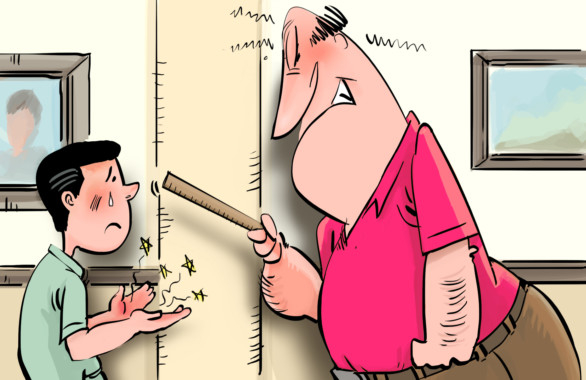
Dubai
Have you experienced physical punishment as a child? With almost a billion children around the world being subjected to corporal punishment, as stated by Unicef, you are not alone.
Gulf News reader Corazon Tarcena, a secretary based in Dubai, is a mother of three children and worked as a teacher in the Philippines for 15 years. Her choice of action was a “slight beating with strong words of correction”. Today, she said her children are grown up and working as professionals and if she ever asks them whether she was a good mum, their response is that they “grew up with good values and manners”.
But, in her years as a teacher, she experienced all kinds of “intolerable attitudes”, especially from teenagers and their parents, who assisted their offspring to continue the “unproductive or unhealthy behaviour”.
She said: “Physical and verbal abuse is now punishable by law in the Philippines. Even if you use stern words on the students, it can be termed as verbal abuse by their parents. I think this is wrong, as it is raising lower and incorrect values amongst some unproductive citizens within a community.”
Jessy Thomas, a professor of dentistry, based in Dubai, believes that mild corporal punishment is “essential for a child’s growth and development”. This is a way to groom them towards socially acceptable and moral behaviour. But, she is against parents punishing their children when they are angry, because it could lead to “violent or irrational” behaviour on their part.
She said: “Yes, it teaches them to fear authority and choose between right and wrong. But, older children should not be punished corporally as they are subject to loss of personal dignity. And schools should not physically punish children above seven years of age as they tend to humiliate a child. Even parents should refrain from harsh punishment, verbal or physical, as the child grows up.”
As a child, she was occasionally subjected to harsh physical punishment. “Once a teacher almost broke my knee and it bled. I was caned for scoring bad marks,” she said.
She doesn’t approve of such treatment, especially if it leaves a mark on the body. When she has to discipline her children, she said she feels “ashamed”.
She said: “I was so angry once, when they were stubborn and crying out at the same time. As a first time mum, I could not or was not mature enough to handle those freak incidents.”
However, a lot of people are not in favour of any form of physical punishment. Jayashree Kulkarni, a teacher based in Abu Dhabi, is one of them and refers to corporal punishment as “unethical and an obsolete practice”. In her opinion, children will vividly remember the punishment they receive as an adult. Thus, allowing them to perceive that “to mete out violence is acceptable”.
She said: “Inflicting bodily pain to the children as a punishment for their unruly behaviour or misdemeanour is wrong. Studies have shown that spanking a child for his or her behaviour will make him or her more stubborn and disobedient.”
She suggests adopting a milder strategy and more leniency when making children realise their mistakes. “Positive approach in rearing a child will go a long way,” she added.
Anna-Karin Marquard, a chief nurse officer based in Ras Al Khaimah, agreed that it is never right to punish a child physically. “If we teach our children that if they do something wrong they will be physically punished, then it will lead to them believing that it is okay to do the same and might even end up fighting outside,” she said.
But, then how would she recommend disciplining children? “Talk to them,” she said.
Having a conversation and discussing their mistake with them is the right approach, in her opinion, with parents explaining to them that their actions can have other consequences if repeated.
A mother of two daughters, she has never “lifted a finger” towards them. If they make a mistake, she would sit them down and talk to them and help them understand why they should not repeat the same mistake. This ensured that they would never lie to her and instead they maintained an open relationship with their mother. “They trusted me and vice versa,” she said.
Mohammad Jalal Hussain, who manages a store in Dubai, believes physical punishment has a lot of “harmful effects” on children. In his opinion, it hurts them emotionally more than physical injuries and they could decide to do something harmful in retaliation.
He said: “With proper guidance or behaviour, it is possible to change children’s attitude. Talk about the incident and help them understand why their behaviour was not good for them or those around them. Help them identify the good or bad effect of their actions.”
Monica Carver, a homemaker based in Dubai, urges parents to take their responsibility as a parent seriously. Violence is not the solution, she stated, and is against the concept of violent punishments.
She said: “Violence begets violence. As a parent, teach your children why they are wrong. My father never beat me.”
Do you support corporal punishment? Tell us what you think at readers@gulfnews.com.








